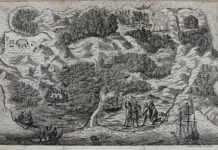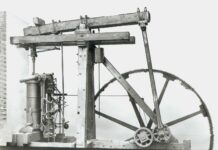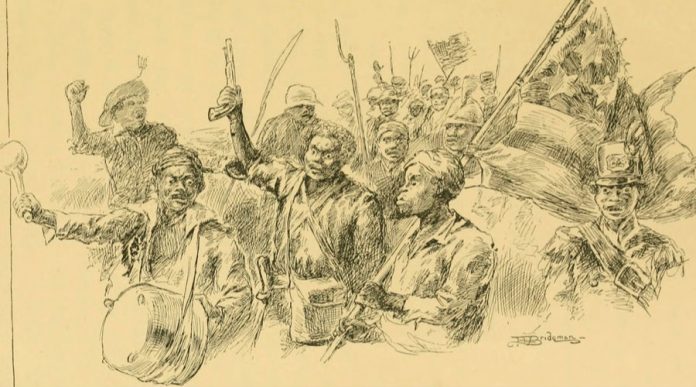
Socialistisk Biblioteks Tidslinje med links til begivenheder og personer i 1811.
Se også Index over personer, organisationer/partier og værker (som bøger, malerier, mm.), steder, begivenheder, mv., der er omtalt på hele Tidslinjen, titler og indhold på emnelisterne osv.
8. januar 1811
USAs største slaveopstand ved New Orleans, Louisiana, starter på Deslondes plantage. Varer til 10. januar, da hundredevis oprørere slagtes af militæret uden for byen.
Se:
1811 German Coast Uprising (Wikipedia.org)
Slaves rebel in Louisiana (African American Registry at WayBack Machine)
1811 German Coast Slave Uprising (Genealogy Trails History Group)
Charles Deslondes (Wikipedia.org)
The unknown slave rebellion. By Derrick Morrison (Against the Current, Issue 156, January/February 2012). Review of Daniel Rasmussen, The Untold Story of America’s Largest Slave Revolt (Harper, 2010)
Marts 1811
Bevægelsen Ludditterne opstår i Manchester i England. I en årrække kæmpede bevægelsen som “maskinstormere” imod industrialiseringen i tekstilindustrien og imod forringelser af arbejdernes løn- og arbejdsforhold.
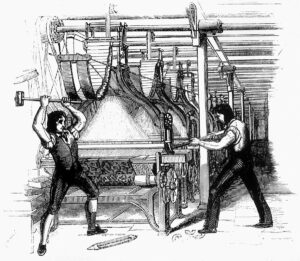
- Luddisme (Leksikon.org)
- The Luddites (Spartacus Educational)
- Luddite (Wikipedia.org). Med henvisninger, bibliografi og links.
- The Luddites and the Combination Acts (Marxists Internet Archive; British History)
The Luddites were onto something. By Devin Thomas O’Shea (Jacobin, July 7, 2023). “England’s Luddites are often dismissed as kooky technophobes. In reality, theirs was a gutsy pre-Marxist workers’ movement that prioritized people and nature over private property.”
Celebrate the return of Ned Ludd (Counterfire, 20 January 2013). “The Luddites were a movement of protest against the use of technology to destroy their livelihoods. John Westmoreland looks at what we can learn from them.”
The Real Luddites. By Simon Basketter (Socialist Worker, Issue 2292, 28 February 2012). “The word ‘Luddite’ is thrown around as an insult – but the truth is that Luddism was a working class movement that struck fear into the hearts of the rich.”
Luddites were not backward looking. By Cathy Nugent (Workers’ Liberty, 22 February 2012). “The Luddite revolt was not, as it has been depicted, an irrational response to ‘inevitable’ technological change. It was an attempt by the groups of workers most affected by industrialisation to stop their livelihoods from being destroyed.”
The Luddites’ War on Industry: A story of machine smashing and spies (Do or Die, Issue 6, 1997, p.65-72). “Summarizing the rise of the Luddite movement”. Også i redigeret udgave på Libcom.org (October 15, 2015)
Rebels against the machine. By Suzanne Jeffrey (Socialist Review, Issue 169, November 1993). “The common view of the Luddites is of mindless machine wreckers. In fact the Luddite movement was a highly politicised response to the assaults of a new ruling class.”
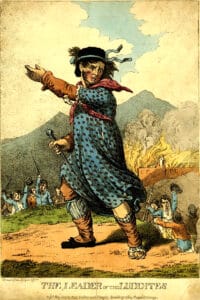
The machine breakers. In E.J. Hobsbawm: Labouring Men: Studies in Labour History, Weidenfeld and Nicholson, 1968, p.5-22; online at Libcom.org). “It was first published in 1952 in the first issue of Past & Present.”
Luddites, Chartists and Plug-Drawers. By Colin Barker (International Socialism, No.40, October/November 1969). Short review.
The Luddites: machine-breaking in regency England. By Malcolm I. Thomis. New edition (David & Charles, 1975, 196 p.; online at Libcom.org) (series: Library of Textile History). “A historical overview and analysis of the Luddite movement 1811-1816 which swept parts of the UK as workers smashed machines to defend their jobs, pay and conditions.”
Se også:
The making of the English working class. By E.P. Thompson (Victor Gollancz, 1963) (online i uddrag på Google Books)
Se også på Socialistisk Bibliotek:
- Tidslinjen: 16. august 1819, om Peterloo-massakren.
- Tidslinjen: 25. november 1830, om Swing-riots.
14. juni 1811
Forfatteren Harriet Beecher Stowe fødes (dør 1896)
Se på Socialistisk Bibliotek:
Tidslinjen: 20. marts 1852, om Onkel Toms Hytte.
5. juli 1811
Venezuela erklærer sig uafhængigt af Spanien.
Se på Socialistisk Bibliotek:
Emnelisten: Hugo Chávez og den ’bolivariske revolution’ i Venezuela
24. december 1811
Det første juletræ tændes i København hos Frederikke Louise og Martin Lehmann (og deres 1½ årige Orla) i Ny Kongensgade nr. 6 (eller 221 ?).

Se:
Københavns første juletræ. Af Karen Sejerøe (Rådshusbiblioteket)
Juletræets historie (Historie-online.dk)
Se også:
Om Orla Lehman: Wikipedia.dk og på Danmarkshistorien.dk
Se på Socialistisk Bibliotek:
Linksamlingen: Jul -andre sider af julen
















